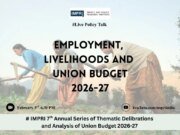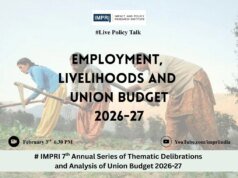Aadithya Sarat
I have been fascinated with the concept of soft power and how it has been used by powerful nations to influence global citizens in some meaningful way or the other. The youth of this generation are easily influenced by mass media and popular culture, which the West has been able to capitalise on effortlessly. In simple terms soft power can be defined as the process of shaping or influencing the preferences of individuals through various aspects which would include culture, social media, popular culture, foreign exchange etc. Soft power as a concept was introduced in the late 1980s, however it was in practice for many centuries.
When it comes to India, we the citizens embrace the notion that we are part of a culturally rich and diverse nation, yet we often undermine the value of what our country is capable of offering at the global level. With this research paper, I hope to look into how tourism performs the role of a soft power tool and how India has efficiently made use of it so far and what are the possible areas in which they can improve the tourism sector. By doing so, this would aid in providing a better understanding on the lasting impact on the foreign and economic policies.
The Ministry of Tourism of India, has set out a blueprint for sustainable development in the form of the National Strategy for Sustainable tourism. As per this blueprint, sustainable tourism should follow three basic principles, environment sustainability, socio-cultural sustainability and lastly economic sustainability.
When one talks about environmental tourism they must take into account and maintain a balance between the needs of the local communities and the tourism industry. The environmental impact must also be kept in mind while promoting tourism. Economic tourism deals with the active role of the Ministry of Tourism in conducting market research in order to guide tourism development in the country. Socio-cultural sustainability is ensured through the preservation of various monuments, landmark areas, heritage sites etc. Ensuring community well being is also an important area that must not be overlooked.
India’s ancient system of medicine, ayurveda also plays a significant role when it comes to tourism as a soft power tool for India. The holistic approach of ayurveda and its consideration of overall wellness and mental health is quite appealing for foreigners. Ayurveda can easily be an alternative option for allopathy medicines and treatments which further helps in adding to its appeal. India’s rich and varied herlitage can be seen through the promotion of religious tourism in India, with the recent kumbh mela serving as a fine example. Similarly, religious Tourism aims to form a deep connection through shared religious heritage as well as spiritual connections.
In the current day and age, we often come across this term that has been mentioned and broadcasted on various platforms. This is none other than the concept of sustainable development, which has been one of the major goals that every developing country plans on achieving. According to the United Nations Sustainable Development Goals, every member state of the UN is expected to achieve the various goals that have been laid out by the year 2030. Keeping this in mind, sustainable tourism is very much relevant to the umbrella concept of sustainable development.
Sustainable tourism is related to three of the seventeen Sustainable Development Goals. SDG number 8 deals with decent work and economic growth, SDG number 12 deals with responsible consumption and production patterns and lastly SDG number 14 deals with life below water. Another crucial term that goes hand in hand with sustainable tourism is something known as responsible tourism. This aims to reduce any sort of negative impact on the economy and social environment by encouraging various actors in the tourism industry to follow ethical practices.
In contrast to traditional diplomatic instruments, tourism functions through experiential involvement, enabling people to create personal and frequently lasting impressions of a country.
In India, tourism is a hugely potent soft power instrument, highlighting its rich cultural heritage, spiritual diversity, and colorful traditions. Development of infrastructure, improved security for tourists, sustainable tourism practices, and facilitating visa processes can further enhance India’s global reputation. When strategically and ethically managed, tourism can increase a nation’s international prestige, promote peaceful international relations, and advance higher foreign policy goals.
As international interconnectedness becomes increasingly intense, the contribution of tourism to soft power diplomacy will probably become even more pivotal turning tourists into unofficial ambassadors and destinations into platforms of influence. Moreover, developing lesser-known places can balance regional development while providing authentic experiences. By developing these sectors, India can not only improve its economy but also enhance its global reach through cultural diplomacy.
About the contributor: Aadithya Sarat is a fellow at DFPGYF Diplomacy, Foreign Policy & Geopolitics Youth Fellow at IMPRI and is an undergraduate student at JDSoLA, NMIMS.
Disclaimer: All views expressed in the article belong solely to the author and not necessarily to the organisation.
Read more at IMPRI:
Terrorist Safe Havens in Volatile States of Africa
Spoilers and Showdowns: What Sudan’s War Teaches Us About Modern Civil Conflicts
Acknowledgment: This article was posted by Bhaktiba Jadeja, visiting researcher and assistant editor at IMPRI.



















